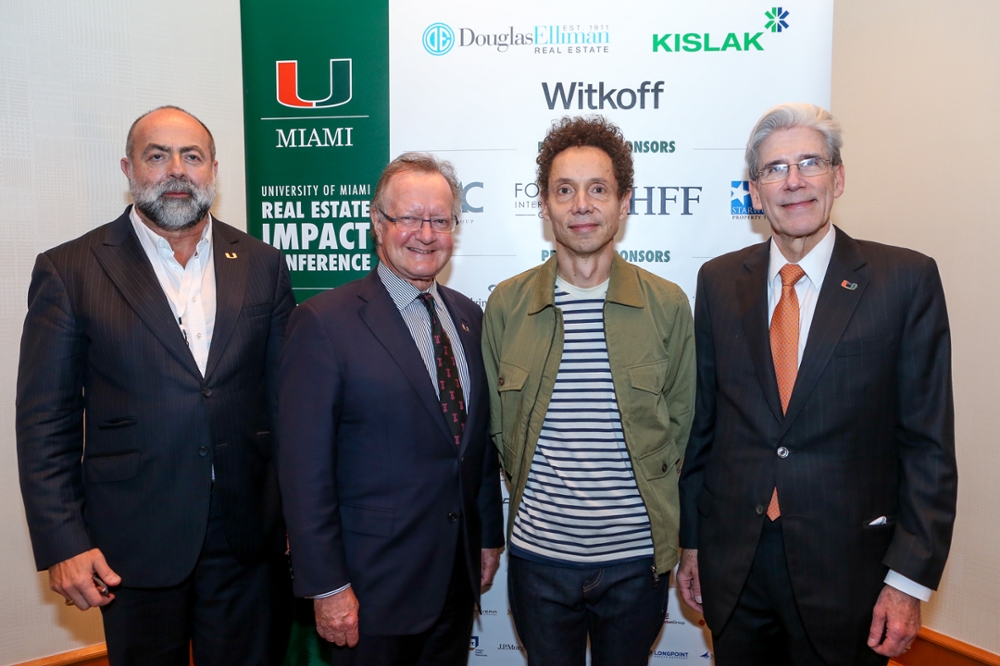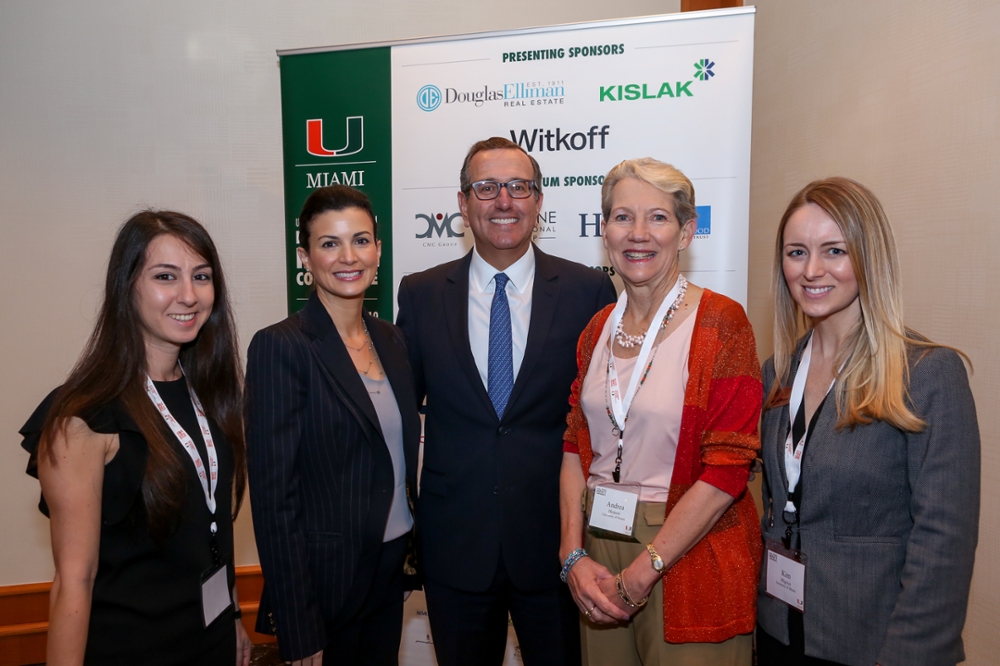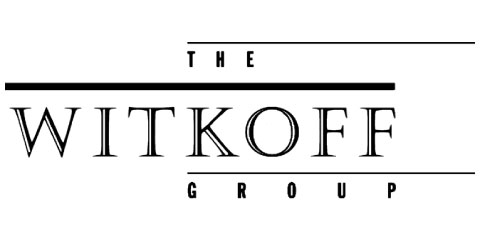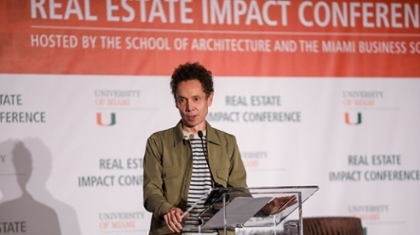“To be a truly effective developer, architect or investor, you need a broad perspective on society,” said keynote speaker Malcolm Gladwell, author of “The Tipping Point,” and four other New York Times best-sellers. “As problems grow more complex, the benefits of wide-ranging training become greater.”

More than 750 University of Miami students and alumni, along with South Florida and national commercial real estate and finance professionals, shared market insights and discussed their career paths at UM’s eighth annual conference.
“One of the functions of our university is to bring people from different backgrounds together at conferences like this to analyze and discuss critical issues of our times,” said University of Miami President Julio Frenk. “Today’s problems do not arise in silos, so it is vital to take an interdisciplinary approach, bringing our students and faculty together with leaders in different areas of real estate.”
After thanking the conference sponsors, including Douglas Elliman Real Estate, Kislak and The Witkoff Group, John Quelch, dean of Miami Business School, said, “This is a remarkable occasion every year, and we appreciate everyone’s participation in this very important event.”
Andrea Heuson, professor of finance and director of Miami Business School real estate programs, added that conference attendance continues to grow, reflecting UM’s commitment to educating the next generation of real estate leaders. “We take a collaborative approach to offering exciting programs in real estate investment and development,” she said. “Our close ties with South Florida’s real estate community help keep us on the leading edge.”

Taking a fresh perspective
In his keynote talk, Malcolm Gladwell went beyond traditional approaches to real estate design and development to examine the psychological and social implications of buildings, streets and neighborhoods.
“We think of buildings as being inert, but I think that is a mistake,” said Gladwell, who has been a staff writer for the New Yorker since 1996 and was named one of TIME Magazine’s 100 Most Influential People. “We spend most of our lives inside buildings, and that sense of place is far more important than we realize.”
Gladwell noted that criminologists have discovered that a small percentage of street segments account for more than half the reported crimes in major U.S. and international cities. “Criminal behaviors appear to be coupled to specific places and environments,” he said. “That means we may be able to flip the principle of coupling on its head, such as building a hospital so people will get well faster or an apartment building that brings joy to the residents.”
Gladwell encouraged both students and professionals to ask “blue sky” questions and think about health and wellbeing at the start of the design process, rather than after a market and financial analysis.
“Don’t get lost in the nuts and bolts of your professional work,” he added. “People are shaped by specific places where they live and work. So those of you who design and build places should think big about your role and how you contribute to the fabric of society.”
Discussing timely market topics
In the conference’s first keynote, Armando Codina, executive chairman, Codina Partners, engaged in a conversation with Hamid Moghadam, chairman and CEO, Prologis. The two have been partners on various projects for more than 20 years, since Moghadam’s fund purchased Beacon Industrial Park from Codina in the mid 1990s.
Noting Codina’s long-term success, Moghadam asked his friend if he had a “sixth sense” about real estate market cycles. “No – I got lucky,” said Codina with a laugh. “It’s about paying careful attention to analytics, trusting your instincts. Don’t think you’re bulletproof.”
While Codina has developed virtually all types of commercial real estate in South Florida, Moghadam has focused on investing in industrial properties on a national basis. “About 2 percent of the global economy goes through our buildings or the buildings of our competitors,” Moghadam said. “With the growth of ecommerce, industrial offers amazing career opportunities for today’s real estate students.”
Later in the afternoon, Avra Jain, founder, The Vagabond Group, moderated a panel discussion with Paul Darrah, director of real estate NYC, Google, and Michael Phillips, president, Jamestown, L.P. whose nationally recognized adaptive reuse developments include Chelsea Market in New York, Industry City in Brooklyn, and Ponce City Market in Atlanta.
“For us, New York is a key hub and we are building a community here,” said Darrah. Google now has four properties on Manhattan’s West Side, including the current redevelopment of Pier 57 on the Hudson River.
Phillips has worked with Google for many years, creating appealing workplace environments for “Googlers” and surrounding neighborhoods. “We believe in making places that bring communities together,” he said. “Simple things like a Halloween costume party in a building are great fun for everyone.”
When Jain asked about Jamestown’s landmark adoptive reuse projects, Phillips said, “The most interesting thing for our team is finding a white elephant and turning it around.” He noted that the redevelopment of Ponce City Market came in $100 million over budget, but now has a strong balance sheet and has been “immensely successful” in creating a sense of community.
Bringing students, alumni and professionals together
Conference chair Charles Bohl, director of the Masters in Real Estate Development + Urbanism (MRED+U) in the School of Architecture, said the annual conference is a showcase for UM’s programs. “Our university is an interdisciplinary powerhouse, and we have the support of community of talented professionals, who serve as mentors, offer internships and hire our graduates,” he said.
Steve Witkoff, CEO of the Witkoff Group and chair of the Miami Business School Real Estate Advisory Board, added, “It’s great to see so many professionals here with our students, who are the future of our real estate industry."

Before the first keynote, Jon Kislak presented a video tribute to his father, the late Jay I. Kislak, founder of The Kislak Organization. “This conference fuses two things that were important to him – love of Miami and love of learning,” he said.
Swire Properties supported the conference by providing registration funds for UM students and hosting a luncheon for Swire Scholars and Real Estate Advisory Board members. Kieran Bowers, president, Swire Properties Inc. welcomed attendees like Andrew Lionikis, a graduate student in real estate and architecture. “It’s great to hear from professionals from different backgrounds,” Lionikis said."

Beth Azor, founder and principal of Azor Advisory Services, led an “Advice with Impact” speed-networking session that connected students with real estate professionals. “This was a great opportunity for me to network and learn new things,” said Jorge René Lourenco, an executive MBA student who is director of sales, JoaoFortes Engenharia in Brazil
Prior to the conference, Miami Business School hosted a breakfast reception for South Florida’s Turkish alumni and professional community. Manuel de Zarraga, executive managing director, HFF in Miami and vice chair of the school’s Real Estate Advisory Board, provided an overview of trends in international real estate investment. “International investors also love apartments and industrial properties,” he said.” Miami is also one of the three hottest hospitality markets in the nation.”
| Special Thanks to Our Presenting Sponsors |
 |
 |
 |

